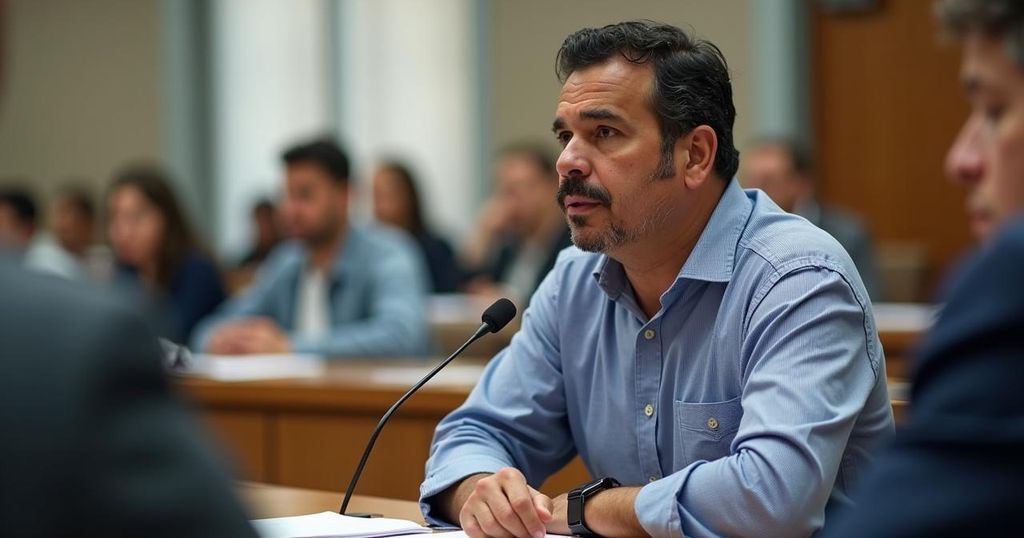Disappearance of Venezuelan Electoral Official Raises Alarms Amid Political Turmoil

Elvis Amoroso, the Venezuelan official who declared Nicolás Maduro the winner of the controversial July elections, has been missing for over ten weeks, leading to rumors of his possible arrest or detention by regime forces. The opposition claims that the election results were manipulated, asserting that Edmundo González was the true victor. Amoroso’s disappearance raises significant concerns about the Venezuelan government’s legitimacy and the repressive measures in place against dissenters.
Elvis Amoroso, the Venezuelan official known for declaring Nicolás Maduro the victor of the contentious presidential election held in July, has not been seen in public for a duration of ten weeks, prompting widespread speculation regarding his fate. Initial reports suggested that Amoroso was arrested in Argentina, possibly facing extradition to the United States. However, more recent rumors indicate that he may be detained by security forces loyal to the Maduro regime due to fears he might defect. Amoroso, appointed as the head of Venezuela’s National Electoral Council, made a public appearance on August 5 to submit documents allegedly proving that Maduro secured nearly 52% of the vote. Nevertheless, the opposition claims that the investigation undertaken by the regime-dominated Supreme Court was a mere façade, designed to conceal the truth that opposition candidate Edmundo González received over 68% of the vote. The international community has largely expressed skepticism regarding the results announced by Amoroso, with many asserting that González was the true winner. Rumors surrounding Amoroso’s disappearance suggest he is currently being held at the Fuerte Tiuna military complex in Caracas, following alleged plans to leave the country. This situation draws parallels to that of former oil czar Tareck El Aissami, who was similarly removed from public engagement and placed under house arrest. Experts speculate that Amoroso’s significance to the regime is substantial; his assertion of Maduro’s victory is paramount to maintaining Maduro’s claimed legitimacy. Antonio De La Cruz, president of Inter American Trends, noted, “This is a guy that the regime can’t allow to leave. What is keeping Maduro in power is Amoroso’s claim that he won, but if he defects and takes that away, Maduro’s claim to legitimacy collapses.” Political science professor Jose Vicente Carrasquero stated, “It would be simply explosive for these people [in the regime] if he was to suddenly appear here in Miami declaring to a television station…‘I was given a piece of paper to read and that was what I said on the night of the election.’” Amoroso’s extended absence has not gone unnoticed and is compounded by a broader campaign of repression that has seen nearly 2,000 dissidents arrested amid claims of electoral fraud. Following his last official appearance, he ceased attending public events or visiting his office, contributing further to the speculation surrounding his situation. Early rumors regarding his arrest in Argentina were dismissed by fact-checkers, yet his whereabouts remain enigmatic. Ivan Simonovis, a former intelligence chief for opposition leader Juan Guaidó, remarked that even if Amoroso were to roam freely, he would be under relentless surveillance, illustrating the precarious position of individuals entrenched with sensitive information pertaining to the regime’s operations.
The article discusses the disappearance of Elvis Amoroso, a Venezuelan official instrumental in affirming Nicolás Maduro’s allegedly fraudulent election victory. Amidst widespread claims of electoral misconduct by the Venezuelan regime, Amoroso’s absence has led to speculation about his safety and allegiance. His unique position makes him a key figure in the legitimacy of Maduro’s presidency, raising implications for the political landscape in Venezuela.
The case of Elvis Amoroso serves as a stark reminder of the intense political repression in Venezuela. His prolonged disappearance raises critical questions about the stability of Maduro’s regime and the lengths to which it will go to preserve its grip on power. The international skepticism over the election results highlights the fragile legitimacy claimed by the Venezuelan government, posing ongoing challenges for opposition figures and advocates of democracy in the region.
Original Source: www.miamiherald.com








